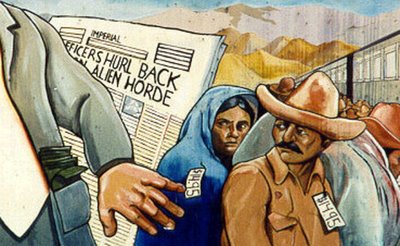The United States of Mexico

It might be fair to say that wars won and lost are legitimate -- a habitual pattern of human history that is often reversed over and over again. Lands are obtained, power is exerted and then lands are regained and power is lost. But it's also fair to recognize the record of history. Large segments of the Middle East, the Mediterranean, the Central Asian Republics, Afghanistan, Pakistan and India were once part of the Persian Empire -- this is significant because people's lives were impacted by these conquests and the residues of linguistic, cultural and religious practices are now part of the fabric of these peoples' lives, long after the conquerors have themselves been conquered. The point being that people nonetheless carry on existing and the mere act of being conquered does not erase them from the face of the planet.
How many people know that nearly 1/4 of the present-day United States, 23.6% of its current land mass -- including the resourceful states of Texas, California, Arizona, Colorado, New Mexico, Nevada and Utah -- was once part of Mexico? How many Americans know that? The farcical headlines about border control between these two nations highlight a severe deficiency in America today, and as far as I can tell, in America from day one: a seemingly innate ability to ignore human history. The first Americans (read: British settlers) cared not a pittance for the natives of that vast and bountiful land they'd found themselves in possession of. Thanksgiving is not a celebration of mutual neighborliness, but rather a misrepresentation of these settlers' concessions to the natives during their first bitter winter in that frontierland. The natives were kind and helpful and taught the settlers how to feed themselves in this land during that first dangerous frost. The Americans accepted their kindness and returned it by killing most of them off.
The best solution to the serious shortcomings of American life, society and culture is a massive increase in population. If Americans had more neighbors and more proximity with other humans, so many of their problems which are increasingly rooted in their isolationist mentality, would be resolved, domestically as well as internationally. Europeans aren't more civilized than Americans, they're just more comfortable interacting with people because their countries are so tightly knit. The US is, after all the world's 3rd largest country according to land area. With an inhabitable land mass of 9,631,418 square km and a population of only 298,754,511 -- that calculates to a population density of 31 people per square kilometer. Compare that to Bangladesh where there are 1002 people per square kilometer or Italy where there are 194 people per square kilometer. Even the US's greatest ally, England (it's good to see these two friends again after all that fuss over the 1776 War of Independence) has 384 people per square kilometer.
Thirty people per square kilometer might even seem extensive to anyone who's ever driven through Montana where the number is probably closer to three. It can't possibly be in anyone's interest to have vast breeding grounds of isolationist ignorance -- none of whom, by the way, are doing a great deal of breeding anyway. The best and fastest way to increase the US population is through immigration, something that, in moral terms, the US intrinsically owes to the rest of the world, having achieved such heights (or is it depths?) in making other countries so uninhabitable that their citizens not only leave but escape with hopes of never having to return.
The problem is, the Mexicans are making their own immigration decisions, without consulting the US government which prefers to dole out Green Card Lotteries of its own choosing in order to regulate immigration patterns. But if the US is so adamant to prevent Mexicans from crossing the border, or to control immigration overall, it should stop destroying the economies and societies of other nations so that their citizens will not be forced to leave. At the least, it needs to recognize the patterns of human history and be more welcoming to the very people who may one day conquer it.
Labels: Humane Rights, the US of A









<< Home